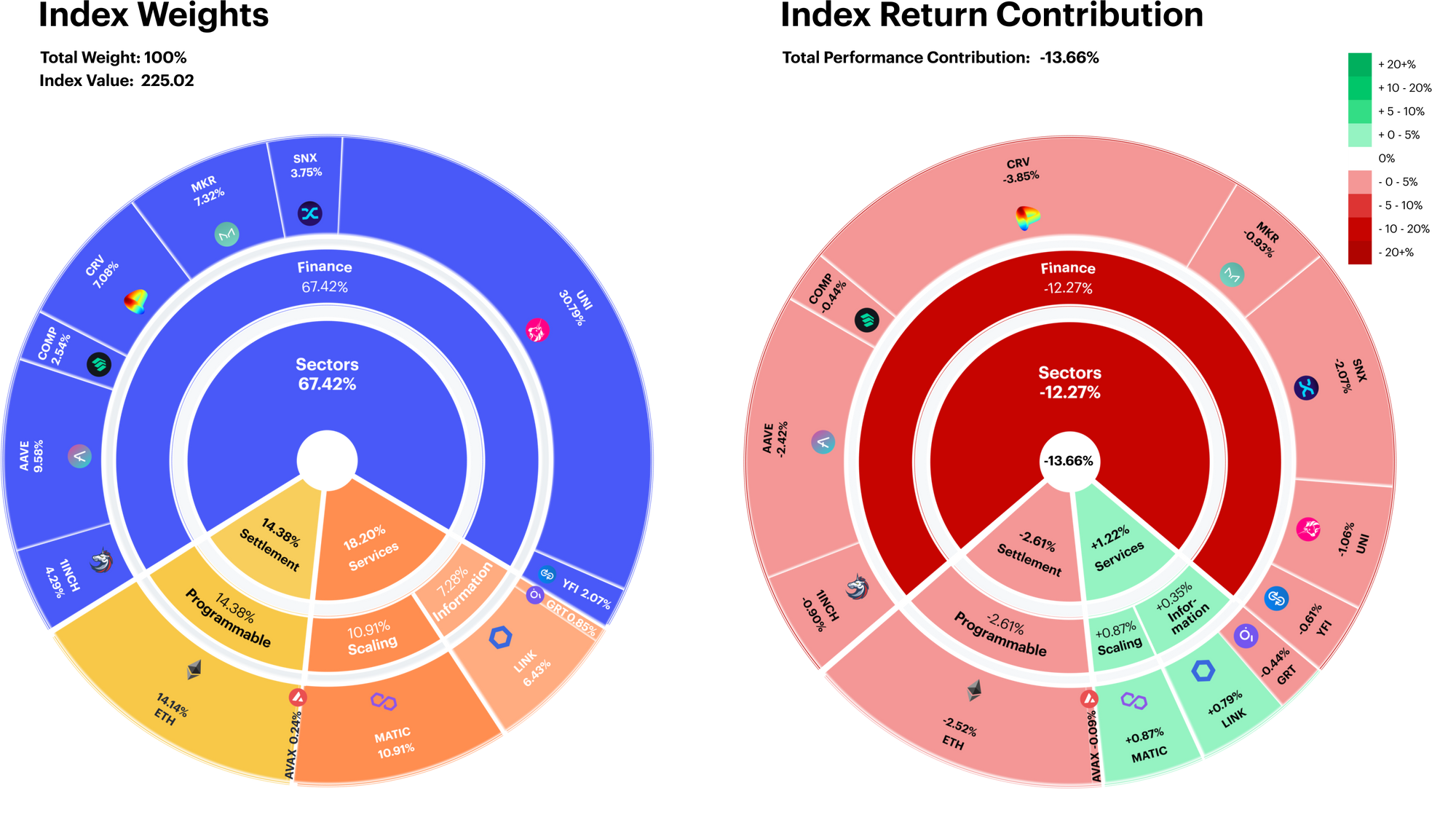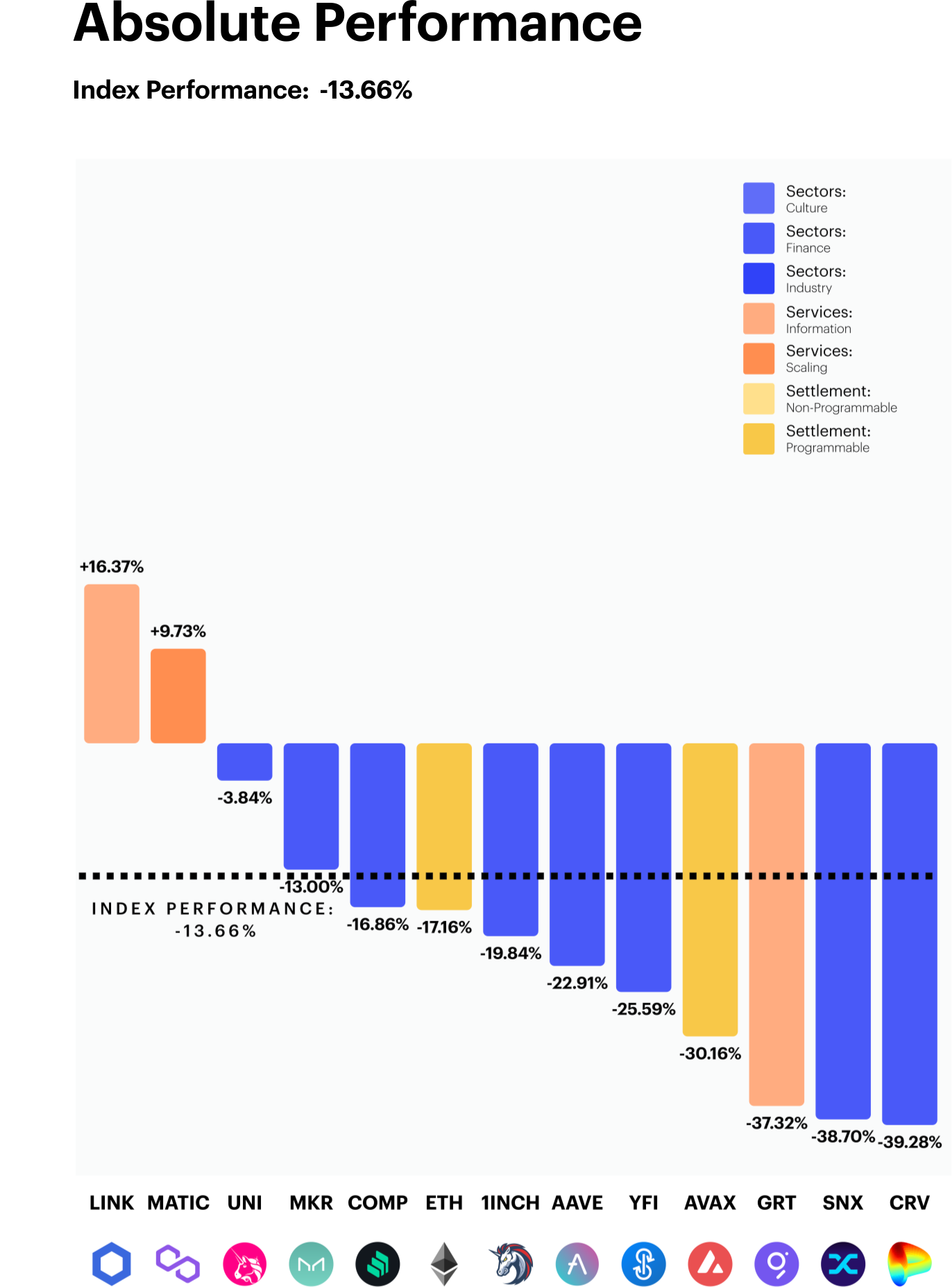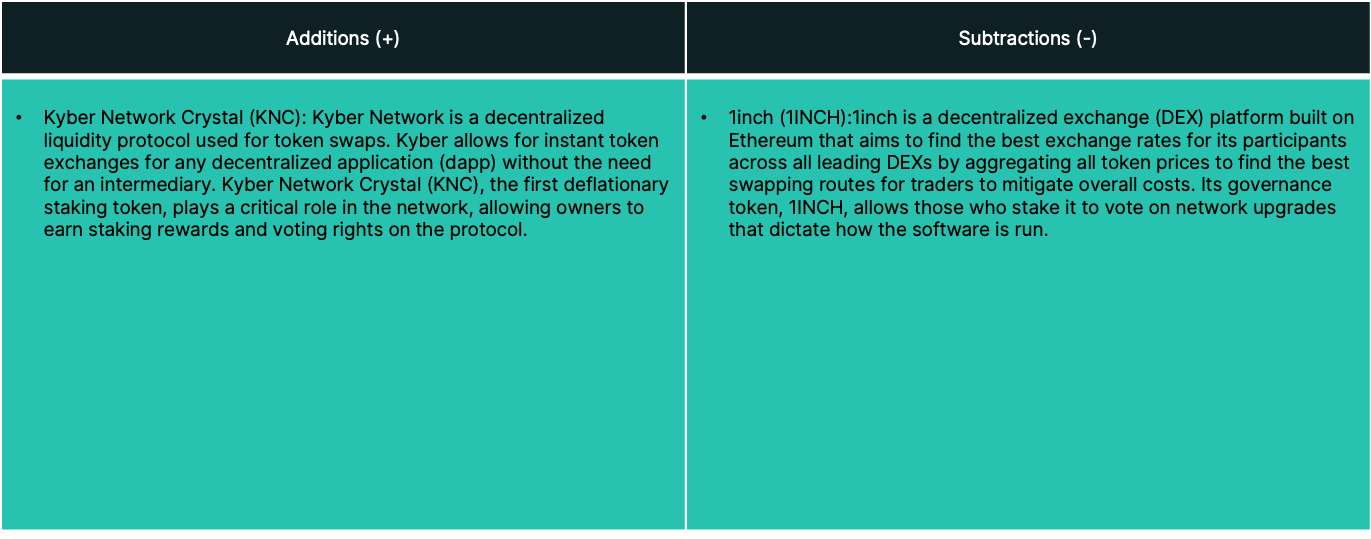Dec 09, 2022
Quarterly Attribution Report: CF DeFi Composite Index
The CF DeFi Composite Index - is a liquid, investible benchmark portfolio index that tracks the return performance of decentralised financial services, commonly referred to as "DeFi". The index is comprised of three distinct sub- portfolios of fixed weight that represent the components of blockchain architecture that are required to deliver decentralised financial services to individual and institutional end users; DeFi Applications, Services and Settlement Blockchains. Digital assets are classified in accordance with the CF Digital Asset Classification Structure (DACS) for sub-portfolio eligibility.

DeFi forfeits price gains with FTX fallout
Another exogenous shock has led crypto markets lower over the last rebalancing period as one of the world’s largest exchanges surprisingly filed for bankruptcy. The CF DeFi Composite Index gave up all its early November gains, finishing the rebalancing period -13.7% lower. The bear market that began earlier this year has only intensified after each over-levered institution or organization collapses. These failures have had a cascading impact on the overall asset class, with the falling prices of crypto markets sparking an industry deleveraging exercise, spreading contagion that leads to even further discounting of crypto assets.
Regarding the macro-environment, risk sentiment has begun to look toward an eventual pivot or slowdown in monetary tightening. The most recent inflationary trends indicate that headline pricing pressures may have peaked in June. This dynamic is expected to be supportive of crypto markets, which face particularly pronounced headwinds from a rising interest rate environment. However, core inflation is likely to be more difficult to tame and the overall level of inflation is likely to remain above any acceptable threshold for some time. This has left crypto market participants in limbo when trying to balance the improving data on the inflation side and spill over impacts from the latest fallout of a major market player.
Services remains defensive
The -13.7% decline in the CF DeFi composite index remained largely concentrated in the Finance segment of the portfolio index. With almost 90% of the negative performance contribution stemming from this category alone. Meanwhile, the Services segment again showed resilience, contributing over 1.2% of positive performance.
MATIC and LINK both led in positive contributions (0.87% and 0.79%, respectively). Conversely, CRV’s larger weight and negative performance subtracted almost 4% of index performance.

Breadth broadly negative for DeFi
The CF Defi Composite Index saw broad negative performance over the course of our rebalance period. From a DACS perspective, all of the Finance category tokens finished in negative territory with CRV and SNX falling almost 40%. It is worth noting that the majority of this negative performance occurred after the collapse of FTX / Alameda, which has had a significant fundamental impact on the space. Total Value Locked (TVL), a proxy measure for the total size of DeFi, saw a reduction of over $20Bn shortly following the surprise collapse. TVL has since stabilized from the sharp decline and has settled just north of $60Bn.
Standout tokens for the quarter included Chainlink (LINK) and Polygon’s (MATIC). The former saw break-out momentum to the upside in late October after developers announced plans to launch their novel staking program which will allow token holders to earn passive income. Lastly, MATIC continued to secure strategic corporate partnerships along with being the public blockchain selected by JPMorgan to facilitate the bank's first ever DeFi trade.

Tokenized FX trade marks milestone
In November, the DeFi space achieved a significant milestone, with JPMorgan executing its first DeFi trade on a public blockchain. The bank is part of the Singapore Central Bank’s DeFi pilot program. The tokenized transaction swapped Singapore Dollars for Japanese Yen from SBI Digital Asset Holdings in early November. Polygon’s blockchain and a modified version of Aave were utilized to execute this historical currency swap. The subsequent press release sent both tokens soaring, but this was short-lived due to the FTX fallout.
Cryptocurrency critics have often cited the the lack of practical use cases for the decentralized technology. However, a milestone achievement such as this gives credence to a potentially much wider use case. The efficiency and scalability advantages of tokenized assets on blockchains will likely transform many markets in the future.

Appendix: Market Performance Overview





Appendix: constituent changes for current period

Appendix: CF Digital Asset Classification Structure
The CF Digital Asset Classification Structure (DACS) classifies coins and tokens based on the services that the associated software protocol delivers to end users, grouping assets by the role they play in delivering services to end users. The CF DACS powers CF Benchmarks' sector composite and category portfolio indices and allows users to perform attribution analysis to better understand the fundamental drivers of returns within their digital asset portfolios.

Additional Resources
For more information about our CF Benchmark indices and our methodologies, please visit the respective web links below:
- CF Diversified Large Cap Index
- CF DeFi Composite Index
- CF Web 3.0 Smart Contract Platforms Index
- CF Digital Culture Composite Index
- CF Blockchain Infrastructure Index
- CF Cryptocurrency Ultra Cap 5 Index
Contact Us
Have a question or would like to chat? If so, please drop us a line to:
The information contained within is for educational and informational purposes ONLY. It is not intended nor should it be considered an invitation or inducement to buy or sell any of the underlying instruments cited including but not limited to cryptoassets, financial instruments or any instruments that reference any index provided by CF Benchmarks Ltd. This communication is not intended to persuade or incite you to buy or sell security or securities noted within. Any commentary provided is the opinion of the author and should not be considered a personalised recommendation. Please contact your financial adviser or professional before making an investment decision.
Note: Some of the underlying instruments cited within this material may be restricted to certain customer categories in certain jurisdictions.

CF Benchmarks

CF Benchmarks

Ken Odeluga


